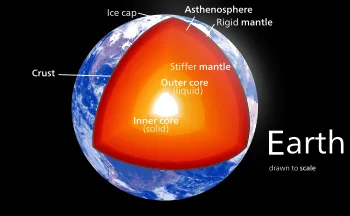
Earth's inner core
Image: Wikipedia
The inner core of our planet has recently stopped spinning and may be in the process of inititing rotation in the opposite direction. That is the conclusion of a recent study by Yi Yang and Xiaodong Song, two Chinese researchers whose work was recently published in Nature Geoscience. According to this piece of research there are cycles hat last multiple details during which the inner core spins in one direction, then slows down and perhaps even tarts rotating in the opposite direction. The forces controlling the process are gravitational forces between the inner core and the rest of the Earth.
This is a fascinating hypothesis. If we were to ask what that would mean for us on the surface he answer would, for obvious reasons, be far from straightforward. For one thing we know very little about what makes up the inner core or what its structure is. It is thousands of kilometers under the surface and we are not able to get anywhere close.
Some claim there is little if any effect the changes in the dynamics of the inner core can have on the climate on the surface. Yet the seismic activity is used to model and track that the inner core as the recent Nature Geoscience article indicates. So clearly the going assumption, at least on he part of some researches, is that what happens with the inner core affects the seismic activity of the surface. Which in turn can easily be expected to affect volcanic activity, amongst other things, which can very easily be expected to affect the climate as well.
Overall this discovery once again underlines the paucity of our knowledge of our planet. And, while we try to make sense of it, awareness of how much we don't know may be the best recommendation at this point. And, as I have already said many times, the confidence displayed by climate alarmists claiming that the climate is changing in an unprecedented fashion, and that this is due to human activities, is likely misplaced. In light of that, it is interesting that there is a well-recognized drastic change in our environment - the continuous movement of the Earth's magnetic poles - that gets very little discussion in the mainstream sources - even though it is happening, and the humanity may indeed want to take the steps necessary to mitigate its possible negative effects.
Now as to the inner core and the outer core of the Earth interacting with each other, one can easily hypothesize that changes in their movement relative to one another, possible shifts in the planet's center of gravity and variations in the gravitational field alone can slightly alter the level of the water in our oceans and through that alone affect the climate. And that has nothing to do with the amount of carbon we put into the atmosphere.
References
Making heads spin: Scientists say Earth’s inner core has changed its rotation
Luke Hurst, Euronews, 10 February 2023
Multidecadal variation of the Earth’s inner-core rotation
Yi Yang, Xiaodong Song, Nature Geoscience, 23 January 2023
2012: Magnetic Pole Reversal Happens All The (Geologic) Time
NASA, 30 November 2011
Links
Follow the link below to see related publications and support this publication
Linktree